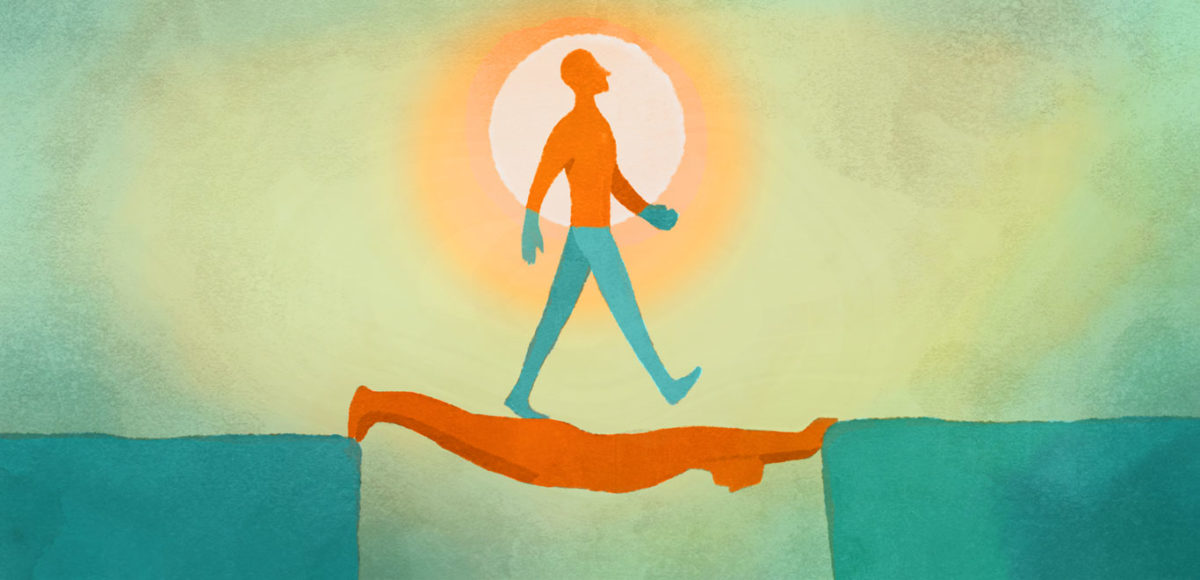by Hubertus Bessau
When my teacher asked about Albert Schweitzer I answered as a 14 years old misfit that I thought he was just an egoist wanting to feel good.
Many years later and still wondering what a little prick I had been I thought about this incident after watching a recommendable TED Talk about effective altruism. I asked myself about the relation of doing others good and feeling good about it. My current result of thinking is: the motif does not matter at the end. It is only the outcome that counts at the end. Good has been done. Maybe at the heart of being altruistic our human nature rewards us with favorable emotions. If this holds true it must have been like this since humans came to be. But then I wondered: Is there a rational side to this, too?
At this point it is a good idea to have a look at the recent developments of the world in the past 100 years. One can clearly see the positive impact of progress since the industrial revolution: democratization and global world trade positively impacted humanity in many dimensions. Life expectancy, the proportion of people in extreme poverty, and lives saved from hunger all improved dramatically. Our installed systems seem to perform in the right way for most of us.
Yet, with further acceleration of progress doubts grow. Where will we be led by our own inventions that were made to improve humanity? Will they distribute wealth in a fair way?
Algorithms cannot put you in jail, can they? Think twice or ask some people if they would rather lose their accounts and all their information in it or spend a day in jail.
All these operating systems have been invented and installed long before the rise of digitization, the real globalization. Reducing friction from lowering entry costs, eliminating costs of geographical distance and increasing transparency all improve the functionality of our markets. In theory this should generate even better results for humanity: increasing supply while lowering prices. This might be the case to a certain extent.
However there are side effects of magnitudes we cannot neglect. So called network effects that thrive in a globalized digital world of this millennium make all the difference. When the value for each participant increases with every additional participant not only does the value of the underlying platform increases, but also the dependency on this platform. A login-effect by the book that reduces the price elasticity and makes switching costly. Thus the price goes up instead of down – whether paid with money or privacy.
Together with network effects digitization has shelled out new billionaires at an unseen pace. New companies grow bigger in ever shorter periods of time. A look at the most valuable listed companies quickly shows that the majority of them have not existed long.
A couple of super rich individuals might not hurt the system as a whole. The real threat is a self-reinforcing effect accelerating the concentration of wealth and power. Today the richest 80 people own as much as the 50% poorest in world. This inequality has increased year by year.
This is not a new problem of our times, but there is something remarkable happening currently that manifests a threat to the future outcome of our beloved and welfare-yielding tandem of democracy and liberal markets. The old equation of money equaling power is still intact, but it is nothing compared to the power of gigantic networks. We have had more or less stable equations that read in short like: Free markets plus many participants plus much progress minus monopolies equal lower consumer prices and therefore more welfare or more disposable income, e.g.: money to spend.
Today money is not even the major part of the equation of these digital mega-kingdoms. Most of their users don’t pay a cent. Yet the dependency on the services is so dire that those digital giants are more than just international companies. Big companies have always tried to influence markets to their own advantage. Sometimes this works, sometimes not. At least the state had the superior power of regulating the frame all companies had to obey. What is new is that today’s digital companies operate less like international companies of the past but more like supra-national states. Digital states play in the same league as real states, not only in terms of headcount and GDP or revenues respectively. They are not only as big as states, but they can easily escape legal frames set by real states because this frame can only be reinforced within certain geographic boundaries. For this reason our new digital giants can trade and negotiate on a face to face level with real states.
Moreover unlike real states these digital companies are not build upon Montesquieu’s idea of division of powers. As real states they even have a legislative, judiciary, and executive powers. The difference is that these powers are not separated. Good-bye fair trials.
Algorithms acting on company policies as judge and police at the same time are not a scenario of a dystopian fantasy. They are reality and you have probably been judged multiple times today alone. To hell with algorithms, you might say, they won’t be storming the Bastille anytime soon, their power stops when it would need you to be physically forced to obey. Algorithms cannot put you in jail, can they? Think twice or ask some people if they would rather lose their accounts and all their information in it or spend a day in jail.
The evidence that digital power has become power in the real world cannot be denied. As a result of digital globalized markets in combination with network effects, we are facing global “winner-takes-all”-markets. Consequently the accumulation of power accelerates even further. We will we have fewer and fewer people getting richer and richer, gathering more and more power. Even without considering artificial intelligence which will speed up this development exponentially this already leads to a binary distribution: a distribution in which one small group or even a single person has all the wealth and power. All versus nothing. It is easy to imagine and it doesn’t need to come that far for all of us to become really uncomfortable. This holds true even for the one having it all. The good message here is: the super rich are well aware.
Imagine your life when you have it all and the rest of the world left with nothing. This would be as unfair as it could get. Even if you are a good person, you would have everyone against you. After all, literally everyone but you would be better off when your accumulation gets redistributed. Technically you would need far less (hu)manpower to suppress many others today than you needed centuries ago. Surveillance, drones, and manipulating software do a good part of the job that once could only be done by an army of loyal subordinates.
Putting this to work might protect your life. But in what world would you like to live? Maybe you can do whatever you want to, but eating lobster everyday and strolling at another beach every sunrise only makes you somewhat happy. Visiting empty Paris with a few chosen dependents you refer to as “friends” or being at a theater on your own is not the same experience. Meeting new people would be impossible. You better hope that virtual reality will be damn convincing by then to give your life a least a fake social touch.
Hence being super rich does not seem desirable. There are more arguments to this insight that are no big news. The supposed privilege of having more than you could possibly consume has always come with many downsides. The Beatles knew “money can’t buy you love”. Telling false friends from real ones makes you paranoid and antisocial. You also have a huge burden of responsibility. Emotionally the upside is tiny too or as Bill Gates put it once: “After all, the burger tastes just the same”.
Having stated the above, you might ask what these highest net worth individuals actually do in reality. Let’s focus on their good behavior here. Thankfully there are the super rich that give back – like the Gates, Buffets, and Zuckerbergs of our world. Now we come back to the original question: why do they do this? What motivates them doing good, being altruistic?
Take a step back to the times of Albert Schweitzer. He traveled long to fight the bad and do good. In a digitized and globalized world, distance does not separate us any longer. Wherever you are you are amidst all of it all: good and bad. Could this very distance diminished by technological progress be the reason why the rich donate their fortune and dedicate their means to doing good? The bigger the inequality in distribution of wealth and combined power gets, the more rational this altruistic behavior becomes from an egoistic perspective. It makes sense to pay your way out of becoming a (close by) target in the near future. This is the rational side of doing good. Surely there still is an emotional part to it as well: you want to enjoy the good in harmony with others on the other hand.
A billion people can still make much more of a difference than a few billionaires.
Rational or emotional, at the end it all comes down to realizing that we humans are social animals. We all want to live in a peaceful world with healthy happy people around us. This is as true for Albert Schweitzer as it is for today’s billionaires and ourselves – no matter for what motif we act.
Dear egoists, in what world do you want to live in? Think it through to the end and then become happy by helping to create it.
Dear altruists, there is hope. Finally all people will realize that in the long term doing good is the right choice even when you only think about yourself. The egoists will be on your side.
With all this optimism there is still one question to be answered: If we know where our current societal operating systems will lead should we really trust in people’s goodwill to realize and act accordingly? Or should we rather update our old systems, alter our rules at a global scale and build our future on something more suitable for the digital era, dear policy makers?
Dear all, we are part of this too. Don’t count on the billionaires, egoists, altruists, or policy makers. In order to prevent our world to go down the inequality drain everyone will be needed. We all are part of the solution. It is not too late. A billion people can still make much more of a difference than a few billionaires.
Start making a difference today. What does it take to overcome your system-loyal habits and instead give more than you take? Along comes happiness.

 | Technology, AI and ethics.
| Technology, AI and ethics.

